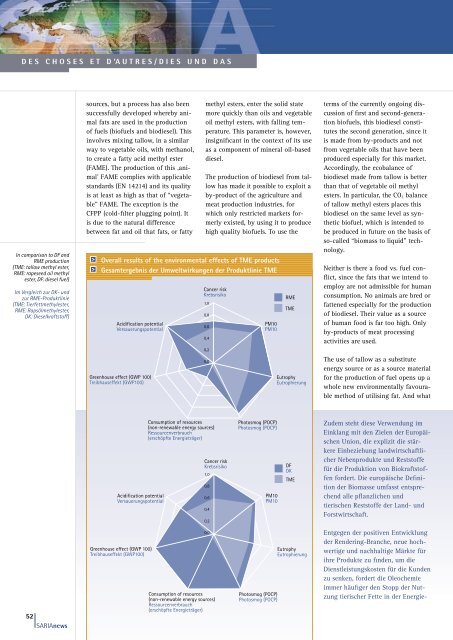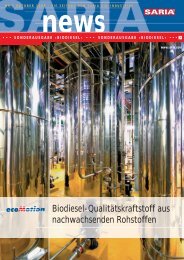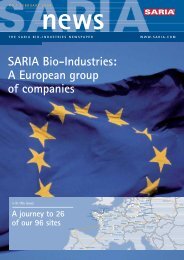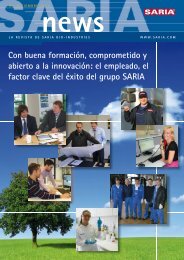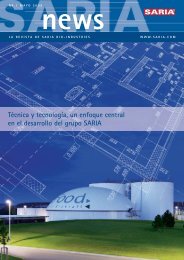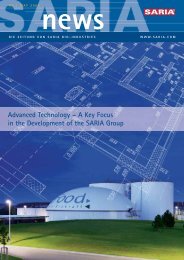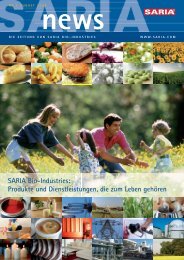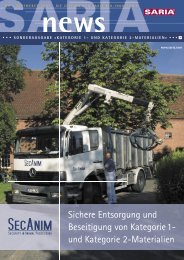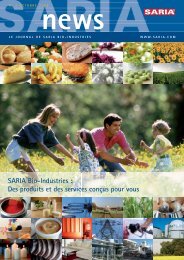PDF - Saria Bio-Industries AG & Co. KG
PDF - Saria Bio-Industries AG & Co. KG
PDF - Saria Bio-Industries AG & Co. KG
Erfolgreiche ePaper selbst erstellen
Machen Sie aus Ihren PDF Publikationen ein blätterbares Flipbook mit unserer einzigartigen Google optimierten e-Paper Software.
d e s c h o s e s e t d 'a u t r e s / d i e s u n d d a s<br />
In comparison to DF and<br />
RME production<br />
(TME: tallow methyl ester,<br />
RME: rapeseed oil methyl<br />
ester, DF: diesel fuel)<br />
Im Vergleich zur DK- und<br />
zur RME-Produktlinie<br />
(TME: Tierfettmethylester,<br />
RME: Rapsölmethylester,<br />
DK: Dieselkraftstoff)<br />
sources, but a process has also been<br />
successfully developed whereby animal<br />
fats are used in the production<br />
of fuels (biofuels and biodiesel). This<br />
involves mixing tallow, in a similar<br />
way to vegetable oils, with methanol,<br />
to create a fatty acid methyl ester<br />
(FAME). The production of this ‚animal’<br />
FAME complies with applicable<br />
standards (EN 14214) and its quality<br />
is at least as high as that of “vegetable”<br />
FAME. The exception is the<br />
CFPP (cold-filter plugging point). It<br />
is due to the natural difference<br />
between fat and oil that fats, or fatty<br />
methyl esters, enter the solid state<br />
more quickly than oils and vegetable<br />
oil methyl esters, with falling temperature.<br />
This parameter is, however,<br />
insignificant in the context of its use<br />
as a component of mineral oil-based<br />
diesel.<br />
The production of biodiesel from tallow<br />
has made it possible to exploit a<br />
by-product of the agriculture and<br />
meat production industries, for<br />
which only restricted markets formerly<br />
existed, by using it to produce<br />
high quality biofuels. To use the<br />
Overall results of the environmental effects of TME products<br />
Gesamtergebnis der Umweltwirkungen der Produktlinie TME<br />
<br />
<br />
<br />
<br />
<br />
<br />
<br />
<br />
<br />
<br />
<br />
<br />
<br />
<br />
<br />
<br />
<br />
<br />
terms of the currently ongoing discussion<br />
of first and second-generation<br />
biofuels, this biodiesel constitutes<br />
the second generation, since it<br />
is made from by-products and not<br />
from vegetable oils that have been<br />
produced especially for this market.<br />
Accordingly, the ecobalance of<br />
biodiesel made from tallow is better<br />
than that of vegetable oil methyl<br />
esters. In particular, the CO 2 balance<br />
of tallow methyl esters places this<br />
biodiesel on the same level as synthetic<br />
biofuel, which is intended to<br />
be produced in future on the basis of<br />
so-called “biomass to liquid” technology.<br />
Neither is there a food vs. fuel conflict,<br />
since the fats that we intend to<br />
employ are not admissible for human<br />
consumption. No animals are bred or<br />
fattened especially for the production<br />
of biodiesel. Their value as a source<br />
of human food is far too high. Only<br />
by-products of meat processing<br />
activities are used.<br />
The use of tallow as a substitute<br />
energy source or as a source material<br />
for the production of fuel opens up a<br />
whole new environmentally favourable<br />
method of utilising fat. And what<br />
<br />
<br />
<br />
<br />
<br />
<br />
<br />
<br />
<br />
<br />
<br />
<br />
<br />
<br />
<br />
<br />
<br />
<br />
<br />
<br />
Zudem steht diese Verwendung im<br />
Einklang mit den Zielen der Europäischen<br />
Union, die explizit die stärkere<br />
Einbeziehung landwirtschaftlicher<br />
Nebenprodukte und Reststoffe<br />
für die Produktion von <strong>Bio</strong>kraftstoffen<br />
fordert. Die europäische Definition<br />
der <strong>Bio</strong>masse umfasst entsprechend<br />
alle pflanzlichen und<br />
tierischen Reststoffe der Land- und<br />
Forstwirtschaft.<br />
52<br />
SARIAnews<br />
<br />
<br />
<br />
<br />
<br />
<br />
<br />
<br />
<br />
<br />
<br />
Entgegen der positiven Entwicklung<br />
der Rendering-Branche, neue hochwertige<br />
und nachhaltige Märkte für<br />
ihre Produkte zu finden, um die<br />
Dienstleistungskosten für die Kunden<br />
zu senken, fordert die Oleochemie<br />
immer häufiger den Stopp der Nutzung<br />
tierischer Fette in der Energie-


